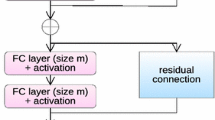Abstract
A generalized Suzuki–Trotter (GST) method for the solution of an optimal control problem for quantum molecular systems is presented in this work. The control of such systems gives rise to a minimization problem with constraints given by a system of coupled Schrödinger equations. The computational bottleneck of the corresponding minimization methods is the solution of time-dependent Schrödinger equations. To solve the Schrödinger equations we use the GST framework to obtain an explicit polynomial approximation of the matrix exponential function. The GST method almost exclusively uses the action of the Hamiltonian and is therefore efficient and easy to implement for a variety of quantum systems. Following a first discretize, then optimize approach we derive the correct discrete representation of the gradient and the Hessian. The derivatives can naturally be expressed in the GST framework and can therefore be efficiently computed. By recomputing the solutions of the Schrödinger equations instead of saving the whole time evolution, we are able to significantly reduce the memory requirements of the method at the cost of additional computations. This makes first and second order optimization methods viable for large scale problems. In numerical experiments we compare the performance of different first and second order optimization methods using the GST method. We observe fast local convergence of second order methods.





Similar content being viewed by others
References
Ball, J.M., Marsden, J.E., Slemrod, M.: Controllability for distributed bilinear systems. SIAM J. Control Optim. 20(4), 575–597 (1982)
Boscain, U., Caponigro, M., Chambrion, T., Sigalotti, M.: A weak spectral condition for the controllability of the bilinear Schrödinger equation with application to the control of a rotating planar molecule. Commun. Math. Phys. 311(2), 423–455 (2012)
Chambrion, T.: Periodic excitations of bilinear quantum systems. Automatica 48(9), 2040–2046 (2012)
Cirac, J.I., Zoller, P.: Quantum computations with cold trapped ions. Phys. Rev. Lett. 74, 4091–4094 (1995)
D’Alessandro, D.: Introduction to Quantum Control and Dynamics. Chapman & Hall/CRC, Boca Raton (2008)
Götschel, S., von Tycowicz, C., Polthier, K., Weiser, M.: Reducing memory requirements in scientific computing and optimal control. In: Carraro, T., Geiger, M., Koerkel, S., Rannacher, R. (eds.) Multiple Shooting and Time Domain Decomposition Methods (2014). Accepted for publication on 2014-09-18
Hintermüller, M., Marahrens, D., Markowich, P.A., Sparber, C.: Optimal bilinear control of Gross–Pitaevskii equations. SIAM J. Control Optim. 51(3), 2509–2543 (2013)
Hohenester, U., Rekdal, P.K., Borzì, A., Schmiedmayer, J.: Optimal quantum control of Bose–Einstein condensates in magnetic microtraps. Phys. Rev. A 75, 023,602 (2007)
Ito, K., Kunisch, K.: Optimal bilinear control of an abstract Schrödinger equation. SIAM J. Control Optim. 46(1), 274–287 (2007)
Kosloff, R., Rice, S., Gaspard, P., Tersigni, S., Tannor, D.: Wavepacket dancing: achieving chemical selectivity by shaping light pulses. Chem. Phys. 139(1), 201–220 (1989)
Liebmann, M.: Ein effizienter Algorithmus zur numerischen Simulation von zeitabhängigen Problemen aus der Quantenmechanik. Diploma thesis, University of Graz, Institute for Mathematics and Scientific Computing (2005)
Maday, Y., Turinici, G.: New formulations of monotonically convergent quantum control algorithms. J. Chem. Phys. 118(18), 8191–8196 (2003)
Najfeld, I., Havel, T.F.: Derivatives of the matrix exponential and their computation. Adv. Appl. Math. 16(3), 321–375 (1995)
Nocedal, J., Wright, S.J.: Numerical Optimization, 2nd edn. Springer, New York (2006)
Peirce, A.P., Dahleh, M.A., Rabitz, H.: Optimal control of quantum-mechanical systems: existence, numerical approximation, and applications. Phys. Rev. A (3) 37(12), 4950–4964 (1988)
Shapiro, M., Brumer, P.: Quantum Control of Molecular Processes. Wiley, Hoboken (2012)
Sternberg, J., Griewank, A.: Reduction of storage requirement by checkpointing for time-dependent optimal control problems in ODEs. In: Bcker, M., Corliss, G., Naumann, U., Hovland, P., Norris, B. (eds.) Automatic Differentiation: Applications, Theory, and Implementations. Lecture Notes in Computational Science and Engineering, vol. 50, pp. 99–110. Springer, Berlin (2006)
Suzuki, M.: Fractal decomposition of exponential operators with applications to many-body theories and Monte Carlo simulations. Phys. Lett. A 146(6), 319–323 (1990)
Suzuki, M.: General theory of fractal path integrals with applications to many-body theories and statistical physics. J. Math. Phys. 32(2), 400–407 (1991)
Turinici, G.: Beyond bilinear controllability: applications to quantum control. In: Kunisch, K., Leugering, G., Sprekels, J., Tröltzsch, F. (eds.) Control of Coupled Partial Differential Equations, vol. 155, pp. 293–309. Birkhäuser, Basel (2007)
Turinici, G., Rabitz, H.: Quantum wavefunction controllability. Chem. Phys. 267(1–3), 1–9 (2001)
von Winckel, G., Borì, A.: Computational techniques for a quantum control problem with \({H}^1\)-cost. Inverse Probl. 24(3), 034,007 (2008)
von Winckel, G., Borzì, A., Volkwein, S.: A globalized Newton method for the accurate solution of a dipole quantum control problem. SIAM J. Sci. Comput. 31(6), 4176–4203 (2009/2010)
Zhu, W., Botina, J., Rabitz, H.: Rapidly convergent iteration methods for quantum optimal control of population. J. Chem. Phys. 108(5), 1953–1963 (1998)
Acknowledgments
The first author gratefully acknowledges support from the International Research Training Group IGDK1754, funded by the German Science Foundation (DFG).
Author information
Authors and Affiliations
Corresponding author
Additional information
Communicated by Volker Schulz.
Rights and permissions
About this article
Cite this article
Henneke, F., Liebmann, M. A generalized Suzuki–Trotter type method in optimal control of coupled Schrödinger equations. Comput. Visual Sci. 17, 277–293 (2015). https://doi.org/10.1007/s00791-016-0266-2
Received:
Accepted:
Published:
Issue Date:
DOI: https://doi.org/10.1007/s00791-016-0266-2




